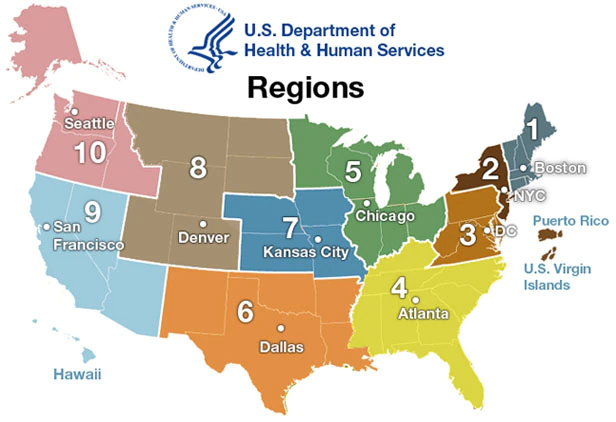Return to the Environmental Justice homepage.

Office of the Assistant Secretary for Health
Regional Health Administrators
As the senior federal public health official and scientist in the region, the Regional Health Administrator performs essential functions for the Department of Health and Human Services (HHS) in three major areas: prevention, preparedness, and agency-wide coordination. These functions directly and indirectly support the work of the Department and the individual federal agencies. An important focus of the activities of the RHAs is to provide regional traction and field support for the implementation of the specific initiatives, programs, and directives of the HHS operating divisions (OPDIVs) and staff divisions (STAFFDIVs). For more information please click on the following link below:
Office for Civil Rights
As the Department's civil rights and health privacy rights law enforcement agency, OCR investigates complaints, enforces rights, and promulgates regulations, develops policy and provides technical assistance and public education to ensure understanding of and compliance with non-discrimination and health information privacy laws, including:
- Ensuring that the privacy practices of several million health care providers, plans, and clearinghouses adhere to Federal privacy requirements under the Health Insurance Portability and Accountability Act (HIPAA).
- Ensuring that the more than 245,000 recipients of Federal financial assistance comply with the nation's civil rights laws.
- Enforcing Federal Health Care Provider Conscience Rights.
- Annually resolving more than 10,000 citizen complaints alleging discrimination or a violation of HIPAA.
- Annually certifying more than 2,000 new Medicare applications for compliance with the nation's civil rights laws.
To contact the Office for Civil Rights please click on the following link below:
Office of Minority Health
The Office of Minority Health (OMH) was created in 1986 and is one of the most significant outcomes of the 1985 Secretary's Task Force Report on Black and Minority Health. The Office is dedicated to improving the health of racial and ethnic minority populations through the development of health policies and programs that will help eliminate health disparities. OMH was reauthorized by the Patient Protection and Affordable Care Act of 2010 (P.L. 111-148). OMH programs address disease prevention, health promotion, risk reduction, healthier lifestyle choices, use of health care services, and barriers to health care. The Office also:
- promotes the collection of health data by racial, ethnic, and primary language categories and strengthening infrastructures for data collection, reporting, and sharing;
- works to increase awareness of the major health problems of racial and ethnic minorities and factors that influence health;
- establishes and strengthens networks, coalitions, and partnerships to identify and solve health problems;
- develops and promotes policies, programs, and practices to eliminate health disparities and achieve health equity;
- fosters research, demonstrations, scientific investigations, and evaluations aimed at improving health;
- funds demonstration programs that can inform health policy and the effectiveness of strategies for improving health.
To contact the OMH Regional Staff, please visit:
http://minorityhealth.hhs.gov/templates/browse.aspx?lvl=2&lvlID=188
Agency for Toxic Substances and Disease Registry
The Agency for Toxic Substances and Disease Registry (ATSDR), based in Atlanta, Georgia, is a federal public health agency of the U.S. Department of Health and Human Services. ATSDR serves the public by using the best science, taking responsive public health actions, and providing trusted health information to prevent harmful exposures and diseases related to toxic substances.
Regional staff are often the first contacts on petitions for public health assessments. They are responsible for ensuring that appropriate information is disseminated to individuals and for maintaining contact with the petitioners throughout the process. Regional Operations staff attend public meetings and visit significant sites of interest to ATSDR to maintain up-to-date information on the concerns of the communities and the status of the sites.
Regional Operations staff are involved in the preparation of virtually all health consultations issued by ATSDR, either through writing the consultation or providing technical assistance to the staff in the Emergency Response and Consultation Branch. Most consultations originate with a request to the Regional Offices, and regional representatives perform the initial data review. They often must obtain additional environmental data or demographic and site-specific information for more extensive health consultations.
Regional Operations staff also engages in emergency response and preparedness activities. Staff has expertise in disaster preparedness and has responded to many disasters in communities. Staff has also provided public health support and expertise to assist EPA and other partners during emergency events including developing and distributing information to community members about protecting their health during an emergency and by participating in training exercises with these partners. For more information on ATSDR Division of Regional Operations please click on the following link:



